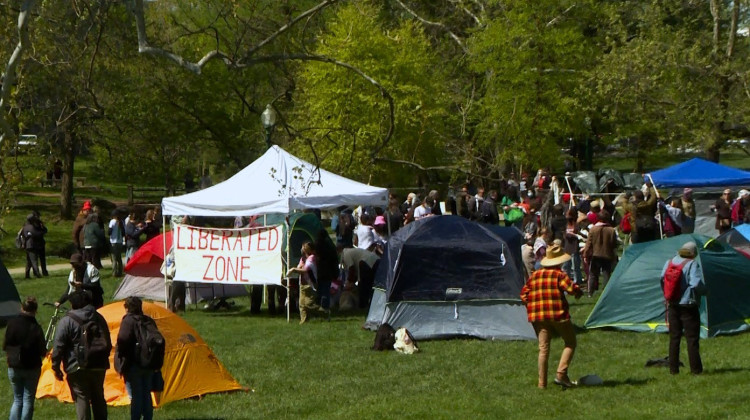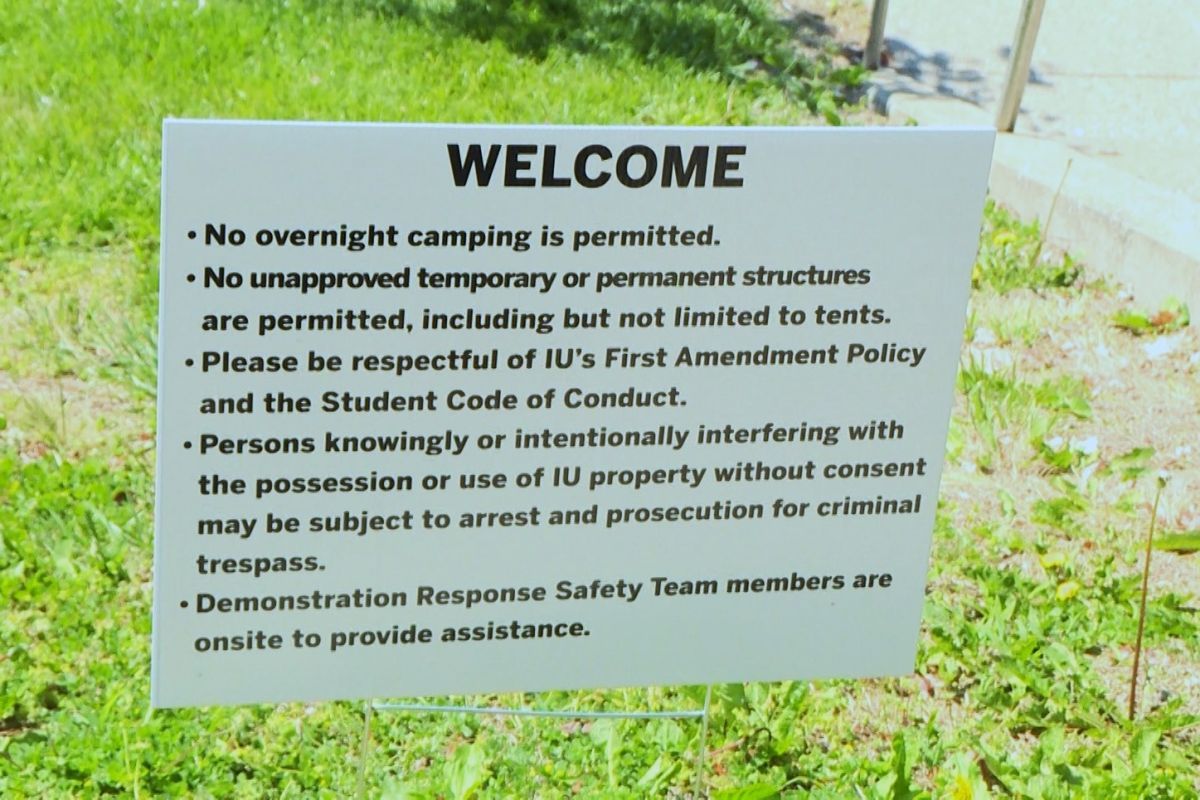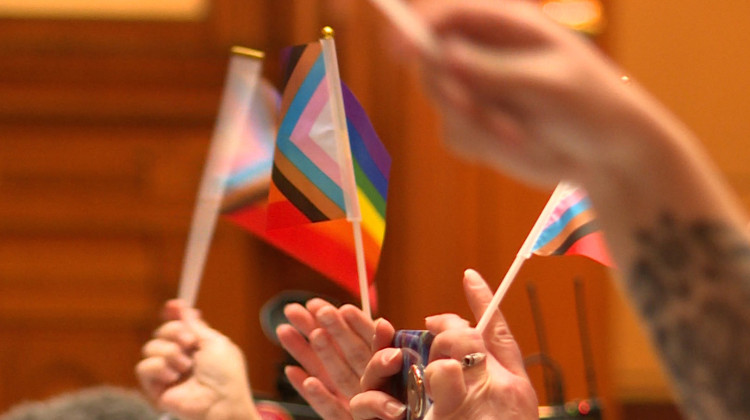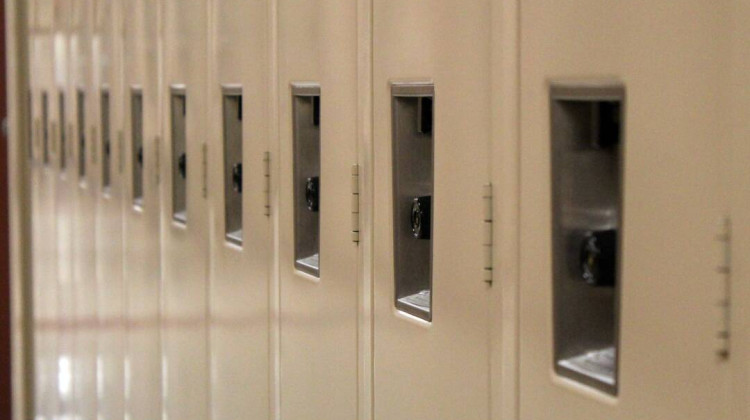
The IU Divestment Coalition pitched more than a dozen tents before the IUPD and Indiana State Police began arrests. (Aubrey Wright, WFIU/WTIU)
Indiana University changed its policy on encampments one day before pro-Palestine protesters began constructing one in Dunn Meadow, changing a decades-old rule and banning unapproved tents, posters and other structures.
President Pamela Whitten confirmed the policy change in an email to faculty on April 25, the same day as the encampment protest and after 34 protesters were arrested.
Whitten said Provost Rahul Shrivastav created an ad hoc committee after becoming aware of the encampment protest. The group changed a policy enacted in 1969. The policy now states structures such as tents and posters must have prior approval.
“The change was posted online and at Dunn Meadow this morning, and participants were told repeatedly that they were free to stay and protest, but that any tent would need to be dismantled,” Whitten said in the email. “Given the expectation of a high number of external participants, Indiana State Police was brought in as a law enforcement partner.”

Since 1969, Dunn Meadow has been designated as an assembly ground at IU. And tents, posters and other structures were allowed in the meadow during the day.
In the 1980’s, in response to South African Apartheid, students created a “tent city,” Law Professor Steve Sanders said with WFIU’s Noon Edition. The shantytown was allowed to continue for weeks.
Sanders said that by changing the policy, the IUPD and Indiana State Police could remove tents.
Sanders said protesters were forced to play by different rules than any other group assembling in Dunn Meadow over the last four decades.
“The First Amendment problem comes, I think, when you have an otherwise neutral, generally applicable time, place and manner policy for protesters and you change it in anticipation of a specific group with a specific viewpoint,” Sanders said. “The policy is no longer neutral.”
Josh Bleisch, attorney with FIRE and IU law alumnus, said on Noon Edition there’s no real way protesters could have complied with the new policy.
“Even if they wanted to seek permission, it was only posted the morning of the planned protest,” Bleisch said, “Practically speaking, it seems like there was no way for them to comply with this new policy, even if they wanted to.”
The encampments at IU follow a national trend. Bleisch said other high-profile college campus encampment protests resulted in drastic use of force. Pure speech about the war with Israel and Hamas will raise emotions, but it’s not harassment or discrimination, he said, and it can’t be punished under the first amendment.
“The First Amendment protects speech, even speech that people find extremely offensive, hurtful, harmful,” Bleisch said. “It’s got very, very limited exceptions.”
In an email, Bloomington Faculty Council President Colin Johnson said no one associated with the council was included in any discussions with the ad hoc committee. Johnson said the council was informed that these decisions had already been made and implemented just a few hours before enforcement activities began. The council found out in a “a very brief meeting” meeting with Shrivastav, he said.
Johnson said the council is in regular conversation with Shrivastav. He acknowledged the work of his colleagues on campus who advocate for free expression and the IUB Demonstration Response and Safety Team.
“Having the opportunity and the right to express our beliefs freely and engage with the perspectives and beliefs of others is fundamental to who and what we are as an institution, and a community,” Johnson said. “As faculty, we are each committed not only to the free expression of ideas in our teaching and research, but also to supporting our students and colleagues in expression of their right to free speech.”
IU Bloomington’s AAUP chapter has condemned the policy change, asked the administration to reverse sanctions and called for an investigation by the Board of Trustees.
“Nowhere is there any indication of how the presence of tents — whether conforming with existing policy or even of ultimately violating it by remaining overnight — endangered the safety and security of the campus, much less required the stationing of snipers on the IMU roof,” the AAUP said.
Police and troopers prepared riot shields and batons, and troopers were armed with tear gas. Indiana State Police confirmed personnel were on the Indiana Memorial Union Building roof.
While troopers move forward, specters on the sidewalk cheering. Protesters have umbrellas today, some goggles too pic.twitter.com/zxCoDGLJp9
— aubrey wright (@aubreymwright) April 27, 2024
The AAUP claimed in its statement that IU’s 1969 Dunn Meadow policy did not prohibit overnight occupation and no policy requiring permission ever existed. The group also said an ad hoc committee should never have been created, based on IU policy.
‘“This was an arbitrary assertion of authority with no consultative or policy basis, designed to block a particular exercise of free speech in a properly designated location as its organizers had planned it,” the AAUP said.
Aubrey Wright is WFIU/WTIU's higher education reporter and a Report For America corps member. Contact her at aubmwrig@iu.edu or follow her on X @aubreymwright.
 DONATE
DONATE







 Support WFYI. We can't do it without you.
Support WFYI. We can't do it without you.